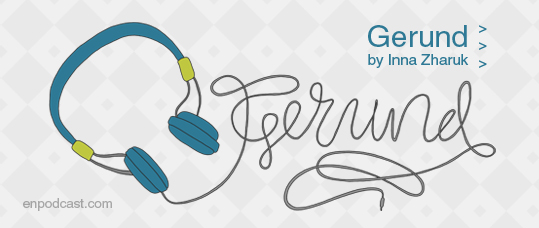Gerund
When one verb follows another, the second is either the gerund (-ing form of the verb) or the infinitive (to + verb). These two verb patterns are used practically in every sentence, so we certainly need to know when to use them. In this podcast, you will listen to the gerund usage. For more information listen to our podcast ‘Infinitive'.
The gerund is formed when we add the ending –ing to the verb. For example:
I hate being late.
'Being' is the gerund.
He advised not taking these pills.
‘Not taking' is a negative form of the -ing verb.
Grammatically, the gerund is a noun made from a verb. We add -ing to a verb when we want to use the verb:
- as the subject of the sentence
Sunbathing at 3 pm is bad for your skin.
'Sunbathing' is the subject of the sentence.
Living alone isn't as fun as it is thought.
'Living' is the subject.
- after a prepositions
This can be verb + preposition, phrasal verbs, adjective + preposition, and a preposition alone.
I apologise for not meeting you at the airport.
‘Apologise for' is a verb + preposition, so we add –ing to ‘meet'.
He gave up smoking a year ago.
‘Give up' is a phrasal verb and the gerund - 'smoking' is used after it.
She is very good at organizing things.
‘Good at' is an adjective with preposition.
He acted without thinking.
‘Without' is a preposition so we add –ing to think.
- after some noun phrases which take the gerund, for example, have difficulty, have no trouble, have a hard/difficult/easy/good time, have fun, have some problems, spend or waste someone's time
We had no trouble recruiting new staff.
They had fun skiing.
- after two useful patterns with ‘It': It is worth and It is no use.
It is worth visiting Prague.
It is no use talking to him.
- after "go + gerund" expressions used for adventure sports or other fun activities
I go swimming twice a week.
They hardly ever go clubbing.
- after possessive forms such as his, her, our, John's, Mary's, and so on
I really enjoy her singing in a shower.
I saw John's leaving.
- after certain verbs such as avoid, admit, fancy, miss, keep, stop, enjoy and many others
He admitted stealing the money.
She keeps talking only about her boyfriend.
There is a big number of these verbs and the list of them you have to learn by heart.
Some verbs which are usually followed by a gerund can also be followed by a noun or a pronoun as the object of the sentence. In this case you will change the gerund into the infinitive. Here is the list of them: advise, allow, encourage, permit, require, urge.
I advise going to a doctor.
The verb 'advise' is followed by the gerund here it is going.
I advise you to go to a doctor.
If we put a noun or a pronoun after 'advise' we have to use the infinitive to go.
Some verbs can be followed by a gerund or an infinitive, but with a difference in meaning. The most important include remember, forget, stop, try, like.
For more details concerning this rule listen to our podcast ‘Change in meaning with Gerund or Infinitive by Mary Mironova'.
Here are some examples and short explanations to them.
- remember
Remember something, then do it.
Please, remember to pick up kids.
Do something and remember it later.
I'll always remember flying over the Pacific Ocean.
- forget
Forget about something, so you don't do it.
I forgot to buy some milk.
(I forgot that I needed to buy some milk)
Do something and forget it later.
I forgot visiting the art gallery in Paris.
(I forgot how I visited the art gallery)
- stop
Give up and no longer do something.
I gave up eating chocolate five years ago.
(For five years I haven't eaten a piece of chocolate)
Stop in order to do something.
Let's stop to have a break.
(We want to have a break and then we will go on working)
- try
Do something as an experiment.
Your hair looks awful, try using a new shampoo.
(To experiment with another shampoo to see if it works)
Do something difficult.
He tried to climb Everest but it was so hard.
(He wanted to climb Everest but didn't succeed)
- Like
Enjoy something as a hobby or interest.
I like gardening.
(Gardening is one of my hobbies and I enjoy doing it)
Do something because it is a good idea.
I like to do washing-up in the evening so next day I will come into a clean kitchen.
(I think it is a good idea to clean the kitchen in the evening but it is certainly not one of my hobbies)
That's it for today. I hope the information was useful for you.
Thanks for listening.
















